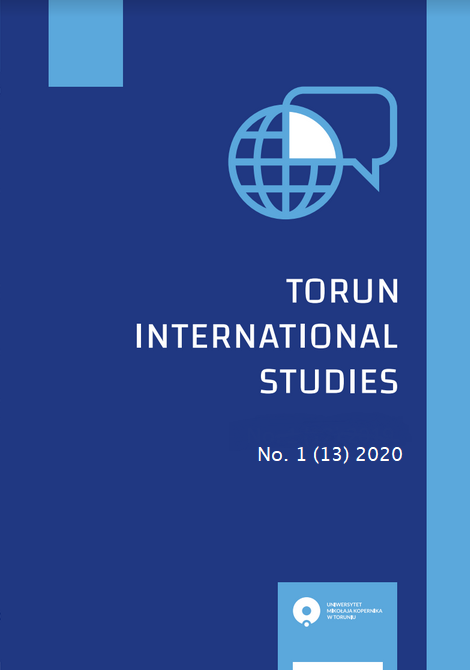TRACING THE CIVILIZATIONAL INFLUENCES IN THE CONSTRUCTION OF CHINESE AND RUSSIAN APPROACHES TO INTERNATIONAL LAW
DOI:
https://doi.org/10.12775/TIS.2020.001Keywords
Civilization, Colonialism, Pragmatism, Russia, China, Identity, Hegemony, International LawAbstract
This article seeks to examine the rigor of civilizational values in modern international law as a crucial factor and how historically different civilizational values have inculcated different approaches to international law. While critiquing the civilizational rhetoric built by European nations in creating Eurocentric international law, this article illuminates how international law has been perceived by China and Russia following their historical complexities as unique states. The results emerging from this paper will demonstrate the diversity in international law in across different countries.References
Amarasinghe, P. (2019). Re-Assessing the Depth of State and International Law in Soviet Ideology. Studi Europene, 14, 73-87.
Amarasinghe, P., & Jayawardane, E. (2018, April 8). Is Sri Lanka Going to be the next China town in Indian Ocean? Countercurrents. Retrieved October 9, 2019, from https://countercurrents.org/2018/02/sri-lanka-going-next-china-town-indian-ocean
Butler, W.E. (2002). On the Origins of International Legal Sciences in Russia: The Role of P.P. Shafirov. Journal of History of International Law, 4.J(1), 1-23.
Elleman, B.A. (2019). The Making of the Modern Chinese Navy: Special Historical Characteristics. Anthem Press, 23.
Fabri, H.R., Jouannet, E., & Tomkiewicz, V. (Eds.). (2008). Select Proceedings of the European Society of International Law, Bloomsbury: Hart Publishing.
Guizot, F. (1997). The History of Civilization in Europe, London: Penguin.
Junwu, P. (2011). Chinese Philosophy and International Law. Asian Journal of International Law, 1, 1-7.
Klimenko, A., & Yurtaev, V. (2019). The Moscow as the Third Rome concept: Its nature and interpretations since the 19th to early 21st centuries. Geopolitica Revista de Estudios Sobre Espacio y Poder, 9(2), 232-251.
Malksoo, L. (2008). The History of International Legal Theory in Russia: a Civilizational Dialog With Europe. The European Journal of International Law, 19(1), 212-232.
Malksoo, L. (2016). International Legal Theory in Russia: A Civilizational Perspective or can individuals be subjects of international law. In A. Orford, F. Hoffmann & M. Clark (Eds.), The Oxford Handbook of the Theory of International Law, Oxford: Oxford University Press.
Malksoo, L. (2017). Russian Approach to International Law. Oxford: Oxford University Press.
Meerills, J.G. (1968). Francisco de Vittoria and the Spanish conquest of the new world. Irish Jurist, 3(1), 187-194.
Safronova, E.V. (2013). Mezhdunarodnoe publichnoe pravo, Teoreticheskie problem. Moscow: RIOR [in Russian].
Shafirov, P. (1973). A Discourse Concerning the Just Causes of the War between Sweden and Russia: 1700-1721. Oceana Publications.
Snyder, А.Е., & Bracht, H.W. (1958). Coexistence and International Law. The International and Comparative Law Quarterly, 7(1), 56-79.
Tin-bor Hui, V. (2008). How China Was Ruled. The American Interest, 3(4), 1-14.
Turner, K. (1993). War, Punishment, and the Law of Nature in Early Chinese Concepts of the State. Harvard Journal of Asiatic Studies, 53(2), 467-489.
Hoffheimer, D.J. (1979). China and the International Legal Order: An Historical Introduction. Case Western Reserve Journal of International Law, 11(2), 2-289.
Wang, T., & Wei, M. (1981). International Law. Beijing: Law Press.
Yin, Z. (2017). Heavenly Principles? The Translations of International Law in 19th century China and the Constitution of Universalit. European Journal of International Law, 4(4), 1005-1023.
Downloads
Published
How to Cite
Issue
Section
Stats
Number of views and downloads: 683
Number of citations: 0



